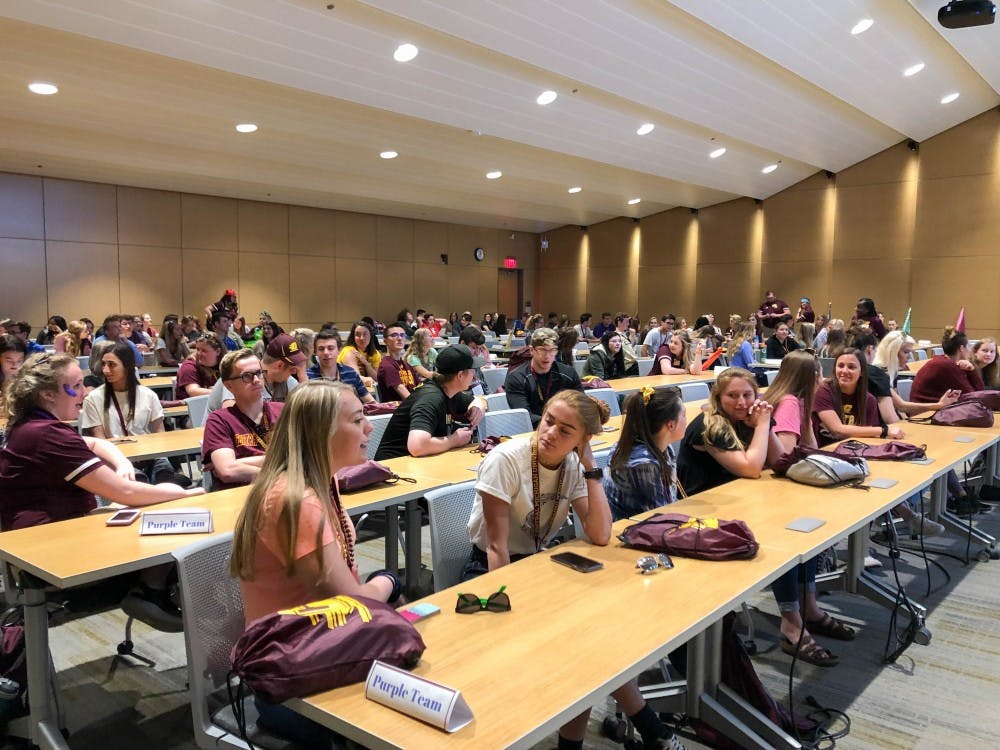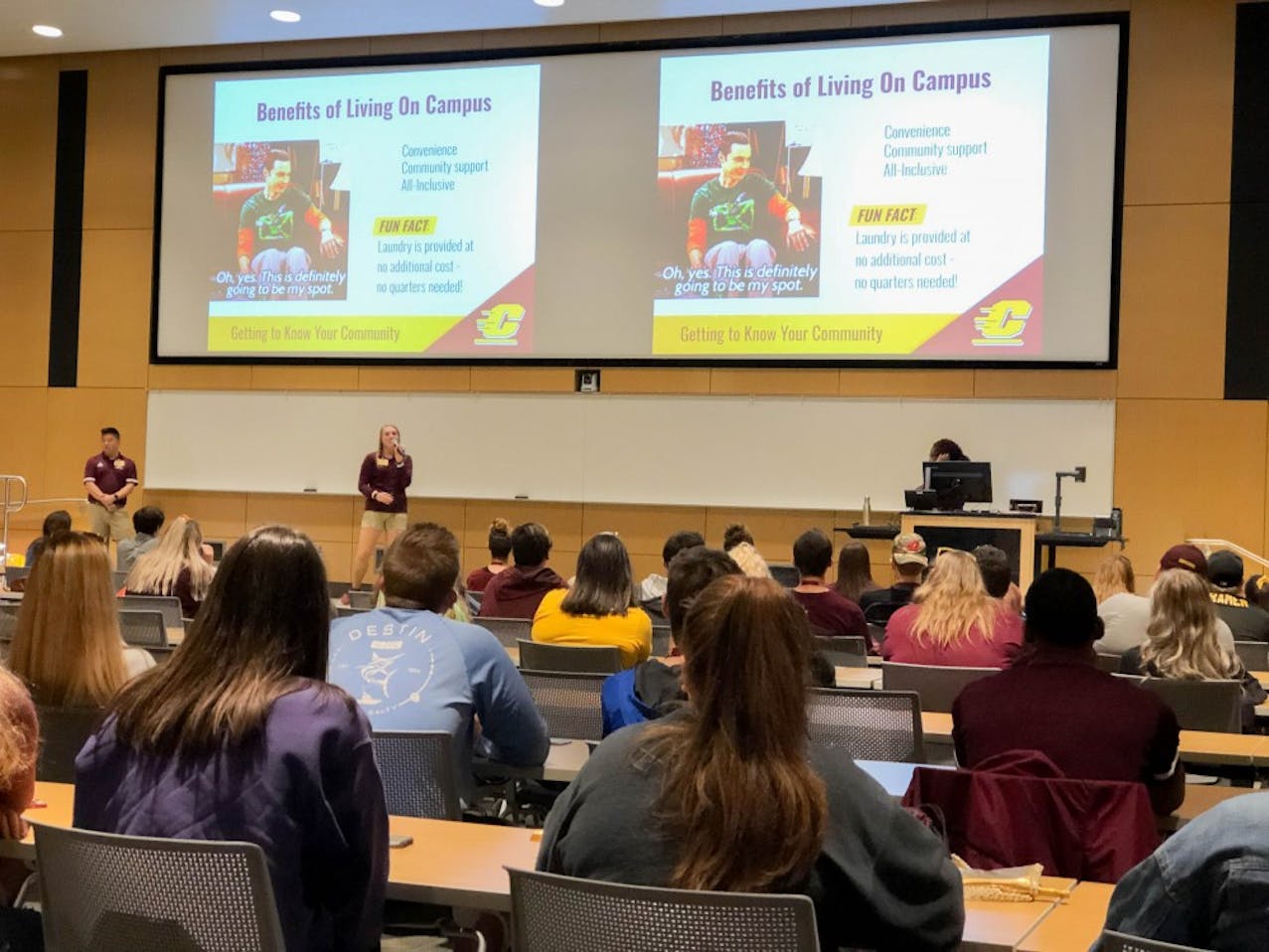Associate Director of OSS discusses changes to new student orientation
Kappus made structural and organizational changes to the one-day orientation program

Incoming freshmen discuss their high school involvements during the Central Success 101 program at new student orientation on June 4 in Biosciences 1010.
Since December, Alex Kappus has been meeting with faculty, staff and students to improve New Student Orientation at Central Michigan University. The associate director of the Office of Student Success made structural changes to the one-day New Student Orientation program and creating long-term goals for the future.
Reimagining Orientation
As part of the Academic Organizational Review, orientation was moved from the Office of Academic Advising and Assistance to the Office of Student Success.
This December, Kappus was hired by the OSS to fill the new role as associate director of new student programs. In this position, it is his responsibility to lead the planning, preparation and implementation of the programs CMU offers for new students. Since then, he has been working nonstop to make this year's orientation program the best it can be.
He began by creating a "Re-imagine orientation" work group to evaluate the proposed changes and decide which ones would be most effective. He also began meeting regularly with the Academic Advising and Assistance staff, who previously ran orientation.
He spent the entire spring semester planning for orientation in the summer. He held workshops and meetings with faculty and administrators to gather input from everyone involved.
One-Day Orientation Program
The bulk of the changes Kappus made were to the one-day New Student Orientation program. The biggest changes were to sequencing and organization.
In the past, Kappus said a student's orientation experience began when they arrived on campus. If they came at precisely 8 a.m., that is when their orientation began. For those who arrived at 9:30 a.m., their orientation began then. Kappus wanted to make sure all students received the same amount of information, because that hour-and-a-half gap makes a big difference in how much content they learn.
This year, the schedule will include what Kappus refers to as a "soft start." Students check in when they arrive and can peruse the new student welcome fair, which is now at the beginning of the day instead of the end. Then, students and supporters head to Plachta Auditorium for a formal welcome from campus leaders, including President Bob Davies.
Representatives at the student resource fair appreciated the switch. Kappus said when the fair was at the end of the day, most students and families were tired and didn't take advantage of the fair as much as he would've liked.
"Our campus partners are coming back and thanking us for changing that," he said. "(They said) 'we've received so much more engagement from students and families than we ever had.'"
Another change Kappus implemented was the method for assigning students to a mentor and orientation group. Before, students were put in a group when they arrived. Now, students will be assigned a group and a mentor based an academic profile they fill out during the orientation registration.
"We're building affinity groups based on their academic interests," Kappus said. "What we hope is that students are making connections in their color team, and then perhaps there will be people they see in their classes in the fall. For the most part, their mentors will be in that academic college as well."
Houghton Lake senior Michael Ignat, a student orientation program assistant, said he thinks this new method will be beneficial for new students.
"The research will show that if you make one friend at orientation, you are more likely to graduate," Ignat said. "Instead of grouping students by what time they arrive, which often groups them into extroverts or introverts, and type A or type B, we will group them based on academic interests, so they may be in the same academic college or even in the same major."
Ignat said this will also be a good way to explain the university's academic colleges to new students. He said most new students don't understand that their program falls into a specific academic college, which may have its own admission and program requirements.
For students who are undecided, there are multiple options. They can join a group for an academic college they are interested in, or, if they have no idea what they want to do, Kappus said they can go to the College of Liberal Arts and Social Sciences for scheduling, since most of their general education courses will be housed in that college.
For the first time, incoming freshmen will get to eat in a residence hall during orientation. Zeeland alumna Elizabeth Deters, a training orientation program assistant, said this is her favorite change to the program.
“In past years, (students) received a box lunch,” she said. “I think the residential restaurants can be a little overwhelming your first time, so what better time to go through it than when people are in the same boat as you?”
A content change that was implemented was the elimination of "choice sessions."
Kappus said there used to be several sessions students could choose from like study abroad, the honors program and academic resources. As a way to make sure every student is receiving the same content, Kappus decided to replace the choice session with "Central Success 101," which focuses on the five lessons every student should know. The curriculum from the former choice sessions will be "sprinkled" into this session.

Incoming freshmen learn about Residence Life during the Central Success 101 program at new student orientation on June 4 in Biosciences 1010.
The five lessons are:
· Get to know the community
· Learn about academic resources
· Get involved outside the classroom
· Embrace diverse experiences
· Make "cents" of finances
“Central Success 101” introduces incoming freshmen to resources like the Office of Student Success and Academic Advising, highlights programs in the Leadership Institute and the Volunteer Center for students to get involved in, and provides tips for living in the residence halls and exploring Mount Pleasant.
Kappus said academic colleges will get more time with students this year than they ever have before. Instead of sending students to the colleges for course scheduling and then sending them right back to the rotunda, colleges will have two full hours with students. Each college is allowed to do whatever they want with those two hours, including scheduling, meet-and-greets with faculty and presentations about programs and resources.
The one-day orientation program will officially end where it began in Plachta Auditorium. Orientation mentors will present their traditional "mentortainment" program, and speakers will present ideas for students and their supporters to think about over the summer.
“We want to communicate that you won’t learn everything in one day,” Kappus said. “The goal is to plant seeds and establish relationships.”
Kappus is a strong believer in the idea that orientation is more than a one-day program. Beside the one-day academic orientation program that students attend in the summer, they also attend the campus life orientation programs like "No Zebras, No Excuses," an inclusion and diversity seminar, and the New Student Convocation during Welcome Weekend.



